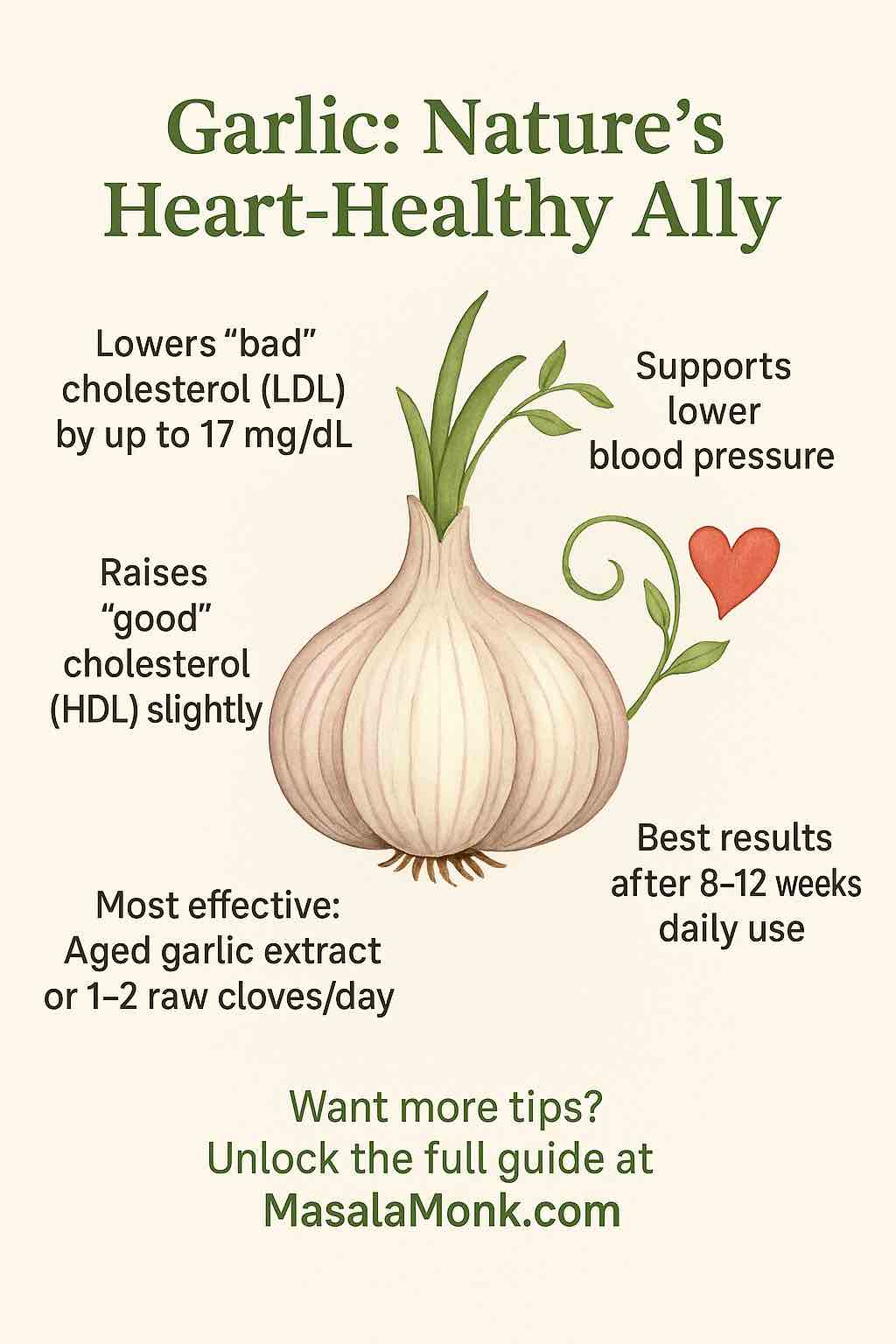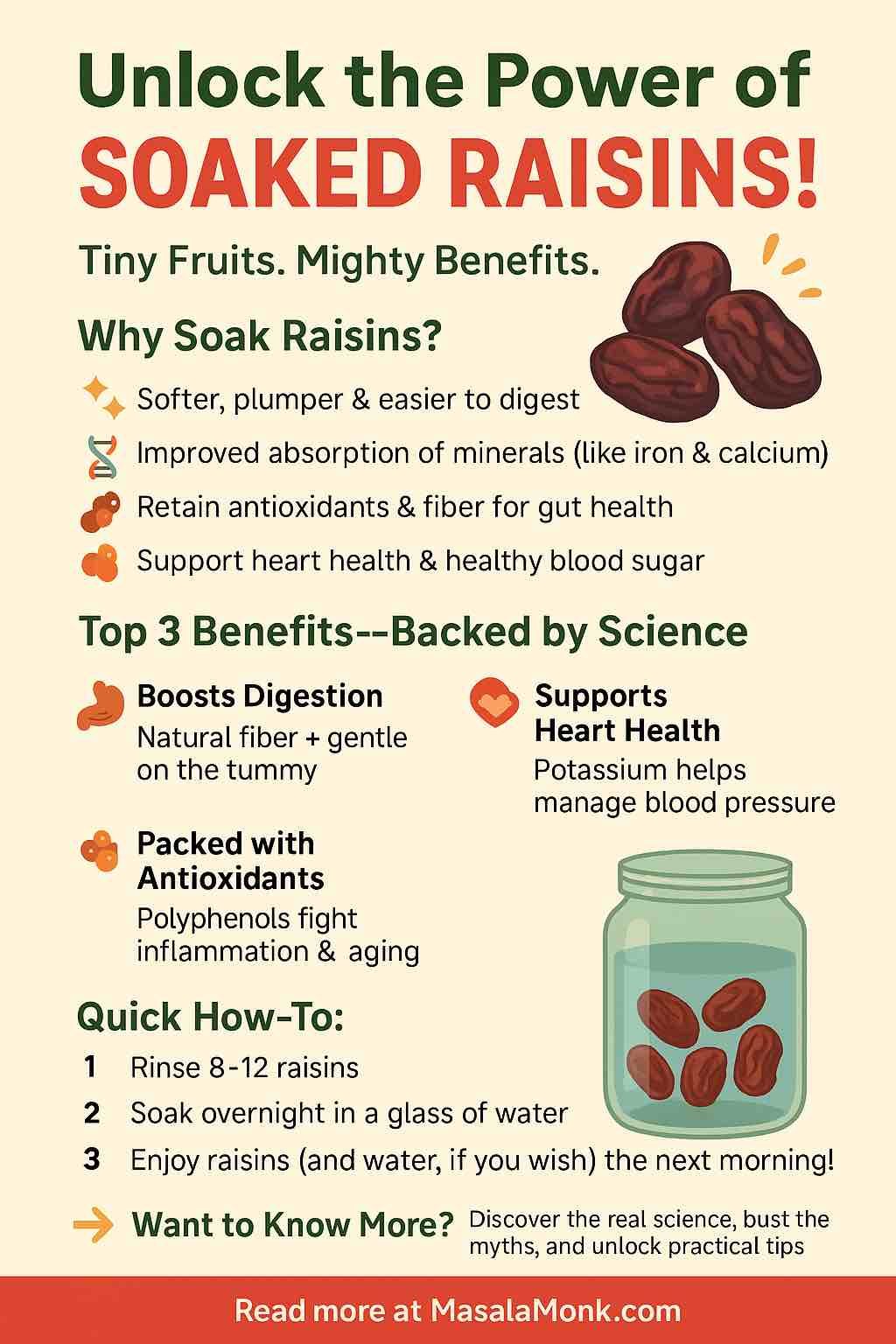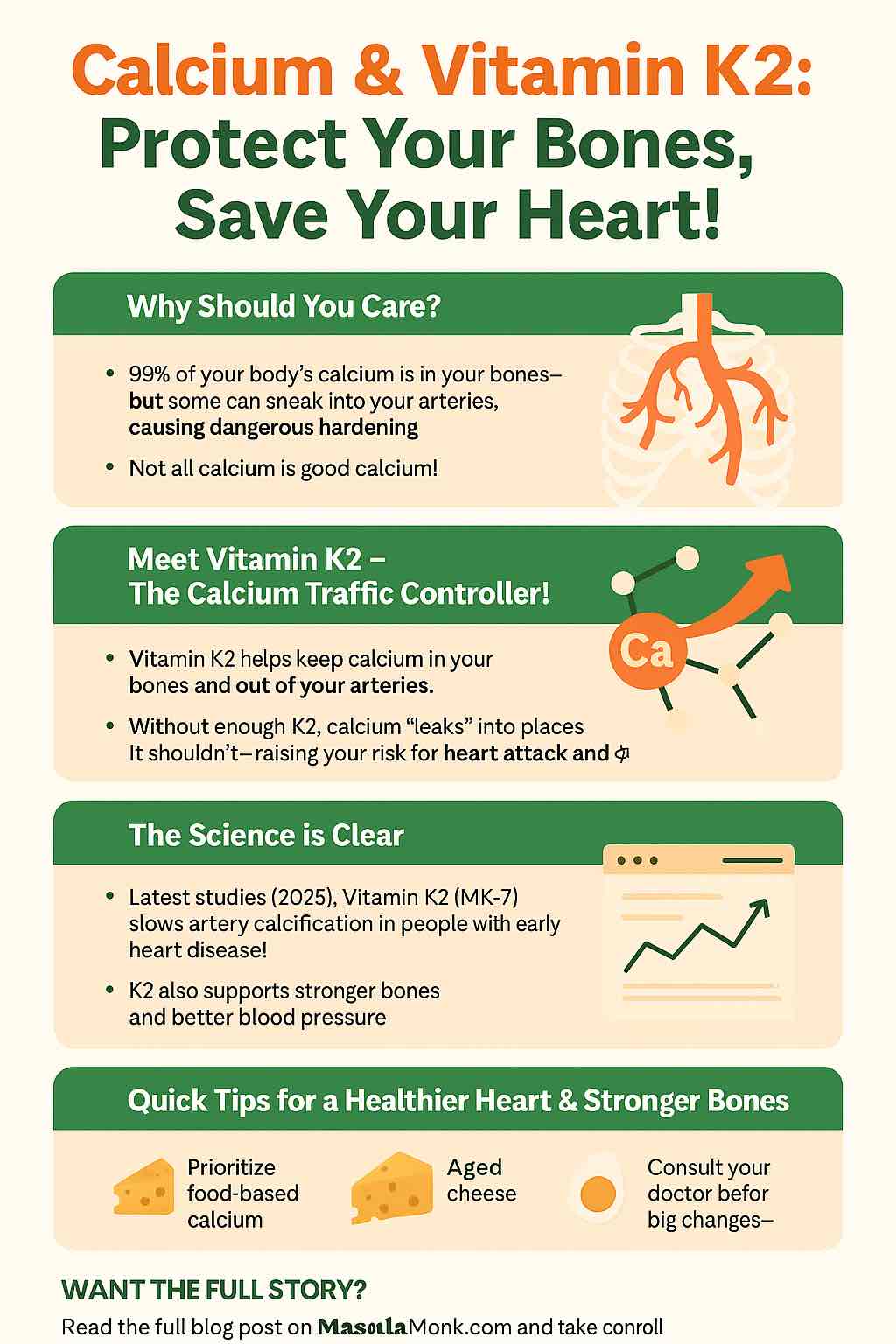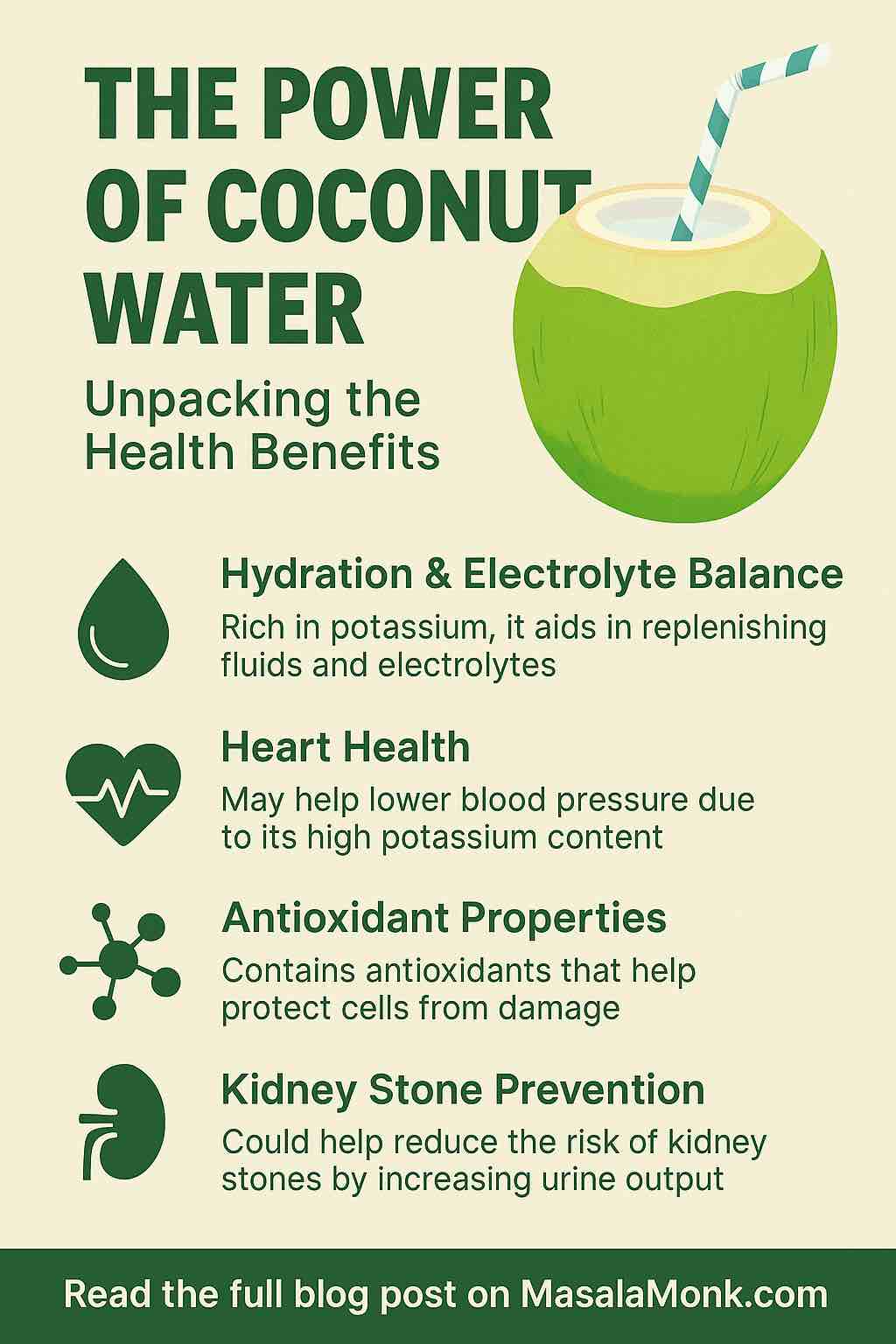
In a world increasingly dominated by chronic diseases, heart health remains at the forefront of global well-being conversations. Elevated cholesterol—particularly low-density lipoprotein cholesterol (LDL, often dubbed “bad cholesterol”)—is a primary risk factor for heart disease, which is still the world’s number one killer. The pharmaceutical industry has produced potent statin drugs, but many people remain interested in natural alternatives and supportive dietary strategies. One ancient remedy that never seems to fade from public interest is garlic.
Long revered in kitchens and folk medicine cabinets worldwide, garlic’s reputation for supporting cardiovascular health is not new. But what does the latest science really say about garlic’s effect on cholesterol and heart health? And how can you, as a health-conscious individual, harness its benefits practically and safely in 2025?
Let’s peel back the layers.
Garlic: A Storied History of Healing
Garlic (Allium sativum) has been used for thousands of years for both culinary and medicinal purposes. Ancient texts—from Egyptian papyri to Greek medical treatises—describe its use for treating a range of ailments, including infections, digestive issues, and circulatory problems.
But it’s only in the last 50 years that scientists have begun to dissect its effects in controlled studies, focusing particularly on its potential to lower cholesterol and protect the heart.
The Science: How Garlic Affects Cholesterol and the Cardiovascular System
What Are the Key Bioactives?
The health-promoting effects of garlic are attributed to its rich array of sulfur-containing compounds. When a garlic clove is crushed or chopped, the enzyme alliinase converts alliin to allicin, which is responsible for that characteristic aroma—and many of its health benefits. Allicin, however, is unstable and quickly breaks down into a host of other sulfur compounds, such as S-allylcysteine (SAC), diallyl disulfide, vinyldithiins, and ajoene.
Aged garlic extract (AGE), produced by soaking sliced raw garlic in ethanol for up to 20 months, transforms these actives into more stable and highly bioavailable compounds like SAC and S-propenylcysteine, both proven to have powerful antioxidant and anti-inflammatory properties.
How Does Garlic Lower Cholesterol?
The latest mechanistic research (2024–2025) points to several ways garlic may impact cholesterol and heart health:
- Inhibiting Cholesterol Synthesis:
Compounds like allicin and its derivatives can inhibit the HMG-CoA reductase enzyme, the same pathway targeted by statin drugs (albeit much less powerfully). - Enhancing Cholesterol Efflux:
AGE has been shown to upregulate transporters (ABCA1 and ABCG1) that shuttle cholesterol out of blood vessel walls and back to the liver for disposal. - Reducing LDL Oxidation:
Garlic’s antioxidants reduce oxidative modification of LDL—a key step in the formation of arterial plaque. - Lowering Inflammation and Supporting Endothelial Health:
Chronic vascular inflammation is a driver of atherosclerosis. Garlic’s anti-inflammatory and vasodilatory effects protect vessel walls and support blood flow.
The Latest Evidence: What Do Clinical Trials and Reviews Say?
1. Meta-Analyses (2024–2025)
- A 2025 meta-analysis in Nutrition Reviews (21 randomized controlled trials, mostly adults with risk factors) found that garlic supplementation:
- Lowered total cholesterol by an average of 10–25 mg/dL
- Reduced LDL (“bad cholesterol”) by 6–17 mg/dL
- Modestly raised HDL (“good cholesterol”) by 2 mg/dL
- Improved triglyceride levels and reduced markers of inflammation and oxidative stress.
- Another 2024 review (Du et al.) found similar results, with the most pronounced effects in people with elevated baseline cholesterol, and greater benefits with longer-duration use and higher doses.
2. Direct Clinical Trials
- A 2025 feasibility trial using fermented garlic extract enriched with nitric oxide in hypertensive patients showed a rapid reduction in blood pressure and improved arterial stiffness—effects relevant to heart health, though lipid outcomes require further study.
- A randomized 12-week trial with endurance athletes given aged garlic extract (Kyolic) (1.2–2.4g daily) demonstrated improved arterial flexibility, higher VO₂max (aerobic fitness), and reduced cardiovascular risk proteins.
- Some smaller or short-duration studies (including a well-designed 6-month Stanford trial with 192 participants) found no significant lipid improvements in people with only moderately high cholesterol, highlighting that individual response and baseline risk matter.
3. Form Matters: Raw, Powdered, or Aged?
- Aged garlic extract (AGE) consistently outperforms other forms, likely due to its unique profile of bioactives and improved bioavailability.
- Raw garlic and garlic powder do show benefit in some trials, but results are more variable, possibly due to differences in preparation, dosage, and study design.
- Black garlic (aged fresh bulbs) and fermented garlic extracts are promising, especially for antioxidant effects and blood pressure, but large-scale human data is still emerging.
4. Other Cardiovascular and Metabolic Benefits
Beyond cholesterol, garlic (especially AGE) appears to:
- Lower systolic blood pressure by ~3–4 mmHg and diastolic by ~2 mmHg
- Reduce fasting blood sugar and improve insulin sensitivity
- Support endothelial function (the health of blood vessel linings)
- Modestly reduce arterial plaque progression in people with metabolic syndrome
Real-World Application: How Much Garlic Should You Take, and In What Form?
Dosage and Duration
- Aged Garlic Extract (AGE):
600 mg to 2,400 mg daily (standardized to S-allylcysteine content), divided into one or two doses, for at least 8–12 weeks is the most well-studied protocol. - Raw Garlic:
1–2 cloves per day (about 4 grams), crushed and left to sit for a few minutes before use, may offer benefits—though consistency of effect is less certain. - Garlic Powder/Tablets:
Look for standardized products with known allicin yield; follow manufacturer guidelines, as allicin content varies greatly.
Tip:
The cholesterol-lowering and vascular benefits of garlic appear to be dose-dependent and duration-dependent—higher doses and longer use (beyond 8–12 weeks) provide the best results, especially in those with elevated baseline risk.
Who Benefits Most?
- People with mildly to moderately elevated cholesterol
- Those at increased cardiovascular risk due to metabolic syndrome, prediabetes, or hypertension
- Individuals seeking natural adjuncts to statin therapy or lifestyle-based heart health plans
Are There Any Risks or Side Effects?
Garlic is generally safe for most adults at culinary or supplemental doses. Common side effects include gastrointestinal discomfort, heartburn, and—of course—garlic breath! At higher doses, garlic can slightly increase bleeding risk, so people taking blood thinners or anticoagulant medications should consult their physician first.
Pregnant or breastfeeding women should consult their healthcare provider before starting high-dose supplements.
Garlic in Your Diet: Practical Tips for Everyday Heart Health
1. Crush, Chop, and Rest
Allicin, the superstar sulfur compound, is only formed when garlic is crushed or chopped. To maximize benefit, let chopped garlic rest for 5–10 minutes before cooking or adding to recipes.
2. Add to Savory Dishes
Garlic’s savory, pungent flavor complements nearly every cuisine. Try it:
- Sautéed with greens, beans, or vegetables
- Stirred into soups, stews, and curries
- Mashed into avocado or hummus
- Minced into salad dressings or yogurt dips
3. Try Aged Garlic Extract
If raw garlic isn’t your thing (or you want a consistent, odorless supplement), opt for a reputable aged garlic extract (AGE). These are widely available, well-tolerated, and backed by the strongest evidence.
4. Experiment with Black or Fermented Garlic
For culinary adventurers, black garlic (sweet, umami-rich, and mild) or fermented garlic extract can be added to sauces, spreads, or even enjoyed on toast.
Myth-Busting: What Garlic Can (and Can’t) Do
Garlic is not a “miracle cure.” While research supports its role in lowering cholesterol and supporting heart health, the effects are modest compared to statins and should be seen as complementary to—not a replacement for—other medical and lifestyle strategies.
Garlic is not a substitute for medical therapy in those with high cardiovascular risk or established disease. Always discuss significant supplement use with your healthcare provider.
Takeaways and Recommendations
1. Garlic can play a valuable role in a heart-healthy lifestyle.
Regular garlic consumption—especially as aged garlic extract—offers modest but meaningful cholesterol-lowering, blood pressure, and anti-inflammatory benefits.
2. Aged garlic extract is the best-studied form.
For cholesterol, aim for 600–2,400 mg daily for at least 8 weeks. For culinary benefit, 1–2 fresh cloves daily is a practical target.
3. Combine garlic with other heart-healthy strategies.
Diet, exercise, weight management, and (when appropriate) medical therapy remain foundational for optimal cardiovascular risk reduction.
4. Talk to your doctor before high-dose supplementation.
Especially if you take blood thinners or have underlying health conditions.
The Bottom Line: A Practical, Heart-Healthy Choice
The evidence is clear: Garlic—especially in the form of aged garlic extract—offers practical, safe, and research-backed support for cholesterol management and heart health. While it won’t replace your statin or lifestyle plan, it can be an effective adjunct for many people—especially those seeking natural solutions.
For best results:
- Choose standardized aged garlic extract for supplements, or eat 1–2 raw cloves daily
- Combine with a balanced, plant-forward diet rich in fiber, healthy fats, and antioxidants
- Stay active and manage other risk factors
The “stinking rose” has never smelled sweeter for your heart!
References & Further Reading
- 2025 Meta-Analysis in Nutrition Reviews
- 2024 Du et al., Clinical Meta-Analysis
- Stanford Garlic and Cholesterol Trial
- VeryWell Health – Garlic Benefits
- News Medical – Garlic and Heart Health
- Spandidos Publications – AGE and Endurance
- Health.com – Black Garlic Benefits
- Frontiers in Nutrition – Fermented Garlic Trial
Ready to give your heart a boost? Make garlic a regular guest at your table—or in your supplement cabinet—and reap the well-documented benefits for years to come.
Frequently Asked Questions (FAQs)
1. Does garlic really help lower cholesterol?
Answer: Yes, multiple high-quality studies and meta-analyses confirm that garlic—especially aged garlic extract—can lower total and LDL cholesterol by about 10–25 mg/dL with consistent daily use for 8–12 weeks or longer.
2. What is the best form of garlic for cholesterol: raw, powder, or aged extract?
Answer: Aged garlic extract (AGE) is the most researched and effective form for cholesterol lowering. Raw and powdered garlic also offer benefits but with more variable results due to differences in allicin and other bioactive content.
3. How much garlic should I take for heart health benefits?
Answer: Most studies recommend 600–2,400 mg of aged garlic extract per day or 1–2 fresh raw cloves daily. It’s important to use these consistently for at least 8–12 weeks to see benefits.
4. Are there side effects or safety concerns with regular garlic use?
Answer: Garlic is generally safe for most people, but high doses may cause digestive discomfort, heartburn, or body odor. It can also increase bleeding risk, especially if you’re on blood thinners—always consult your doctor if you have concerns.
5. Can garlic supplements replace my cholesterol medication?
Answer: No, garlic is not a substitute for statins or prescription cholesterol-lowering medication. It works best as a supportive, natural adjunct alongside a heart-healthy lifestyle or prescribed therapy.
6. How long does it take for garlic to lower cholesterol?
Answer: Noticeable reductions typically occur after 8–12 weeks of daily use, with larger benefits accumulating over longer periods. Results can vary based on baseline cholesterol, garlic form, and consistency.
7. What else can garlic do for my heart besides lower cholesterol?
Answer: Garlic also supports lower blood pressure, reduces arterial stiffness, improves endothelial (vessel lining) function, and has antioxidant and anti-inflammatory effects—contributing to broader cardiovascular protection.
8. Is black garlic as good as regular garlic for cholesterol?
Answer: Black garlic is high in antioxidants and has shown promise for heart health in early research, but more studies are needed to confirm its specific cholesterol-lowering effects compared to aged garlic extract.
9. Should I take garlic on an empty stomach or with food?
Answer: Garlic can be taken with or without food, but some people find it gentler on digestion when taken with meals. Supplements should be used according to the product’s directions.
10. Who should avoid high-dose garlic or garlic supplements?
Answer: People taking blood thinners (like warfarin), those scheduled for surgery, and individuals with a known garlic allergy should avoid high-dose garlic. Pregnant or breastfeeding women should consult their healthcare provider before starting supplements.













